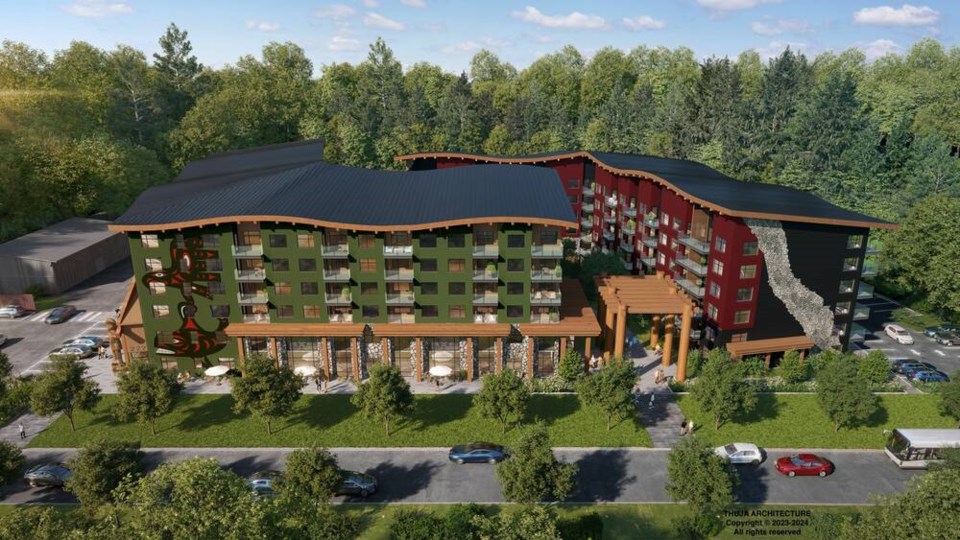The funding was heralded as addressing a severe housing shortage among the First Nations and unlocking economic opportunities

Malahat Nation and Cowichan Tribes are receiving a combined $66.7 million in loans to build 400 on-reserve housing units and critical upgrades for water and sewer treatment.
The funding from the Canada Infrastructure Bank’s Indigenous Community Infrastructure Initiative, announced Wednesday in Duncan, was heralded as addressing a severe housing shortage among the First Nations and unlocking economic opportunities.
Malahat Nation will have access to the lion’s share of the loan, $57.8 million, to help fund the replacement of a 28-year-old water-treatment plant that is at capacity, and to build a new wastewater treatment plant to replace failing septic beds.
The Malahat First Nation said increased water capacity is needed for new housing and business initiatives, while the new wastewater system will better protect local groundwater and shellfish beds in Saanich Inlet.
Malahat Chief Gordon Harry said the investment will deliver modern and reliable water and wastewater plants “for the well-being of our entire community.
“These next steps are vital in creating a brighter future for the next generations, bringing both meaningful employment and the much-needed housing our Nation deserves,” Harry said in a statement.
The investment follows contributions from Indigenous Services Canada as Malahat develops its 52-acre light industrial park adjacent to the Trans-Canada Highway in Mill Bay.
Josh Handysides, chief administrative officer for the Malahat Nation, said planned developments include multi-residential complexes of up to 200 units. That housing could be needed as the nation undertakes projects including a battery storage plant that could generate 100 jobs, a potential film studio complex and a warehouse for Thales Canada, which oversees electronic refits for the Royal Canadian Navy.
Handysides said the new water treatment plant will provide higher volumes and increased firefighting capacity to support larger residential buildings and businesses. He said the wastewater treatment plant will also increase capacity to serve an extra 1,300 homes.
He said the new homes are still in the planning stage, with consultations continuing with members, but will likely be located close to the greenbelts in the nation’s industrial park.
The first building being considered would be up to 160 units, said Handysides, adding there’s a “real lack” of rental housing between Langford and Duncan. “So there’s a massive need in the market around us. That makes it hard for our economy to find employees when there’s no affordable housing around.”
Handysides said the key to bringing more economic prosperity to the Malahat Nation is “unlocking the infrastructure … and we’re doing that now.”
The bank is also providing an $8.9-million loan to Khowutzun Development Corporation, a wholly owned company of Cowichan Tribes, to prepare a site along the Cowichan River for a development called Rivers Edge.
The project, a partnership with B.C. Housing, includes two on-reserve six-storey rental buildings with 200 homes, commercial space, an outdoor kitchen, a children’s play area and community gardens. Its expected completion date is November 2027.
The CIB loan will finance the site preparation, utility upgrades and connections, roads and streetscaping and electric-vehicle charging stations.
That part of the development is also expected to generate career and training opportunities for Cowichan Tribes members and other First Nations through Cowichan Contractors, a group of Cowichan Tribes companies offering services like site servicing and excavation.
Cowichan Tribes members will have the first right of refusal for the 20 per cent of homes at Rivers Edge that will be rented at below-market rates.
The project at 222 Cowichan Way is being built by Knappett Projects Inc.
Cowichan Tribes Chief Cindy Daniels said the increased housing supply will encourage Quw’utsun citizens who have left due to housing shortages to return home. The nation has a waiting list of more than 700 people.
Cowichan Tribes is the largest First Nation in the province, with more than 5,500 members, many of whom don’t live on reserve lands. “The need for housing for our families is acute,” said Daniels.
Canada Infrastructure Bank chief executive Ehren Cory said the Indigenous Community Infrastructure Initiative has eclipsed the $1-billion mark with 30 loans since launching in March 2024.
He said the loans come with favourable interest terms with extended periods to pay them back. “The idea is we’re going to be paid back out of the revenues that the communities will see through economic growth,” said Cory.
He said with the Malahat industrial park, customers will pay for water and wastewater services, and “so over a long period and as a long-term partner, we will be paid back as the community grows.”
Cory said Canada has an infrastructure deficit and the shortfall is most dire in Indigenous communities.
“That’s where we have failed to properly invest for the future in electricity grids and things like water and wastewater,” he said. “Those are the things that drive a prosperous, safe and vibrant community.”
He noted that in many Indigenous communities, about half of community members have left, often because of lack of housing or jobs.
Cory praised the “spirit of partnership” between the Malahat and Cowichan for finding key funding sources in the provincial and federal systems. “We’re happy to be one piece of that puzzle, but I give full credit to the nations for pulling this all together.”
[email protected]